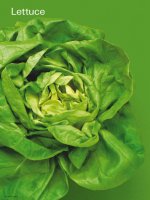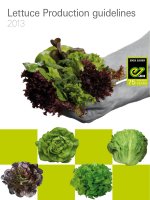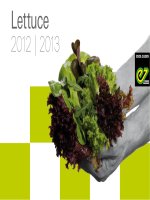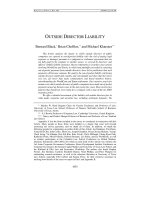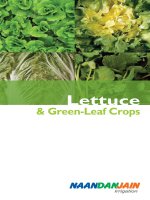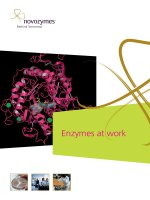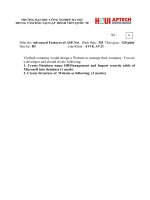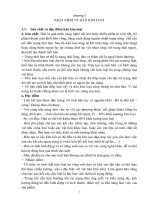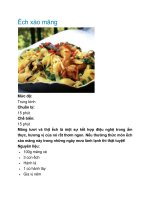Tài liệu Lettuce & Green-Leaf Crops potx
Bạn đang xem bản rút gọn của tài liệu. Xem và tải ngay bản đầy đủ của tài liệu tại đây (1.15 MB, 12 trang )
Lettuce
& Green-Leaf Crops
2
© NAANDANJAIN Ltd. 08/2011
ABOUT LETTUCE AND GREEN-LEAF CROPS
Lettuce is one of the most common crops, grown in •
many areas and in a variety of species.
Lettuce, like other green-leaf crops, is characterized •
by a shallow root system that requires a strict
irrigation regime and control.
Moisture management throughout the growing season •
is a critical factor for the production of commercial
quality lettuce and green-leaves. Even relatively short
periods of inadequate soil moisture can adversely
affect the crop.
Lettuce yields can reach up to 50-70 tons/hectare, •
depending on the species, number of growth cycles
and soil conditions.
Duration of growth on soil: in the autumn 60-90 days, •
in the summer 21-30 days.
CLIMATE
The lettuce plant is best suited to a moderate climate,
with temperatures of 13-16 C°.
During germination, temperatures of 7-24 C° are •
required.
Short days are ideal for growing lettuce. Days lasting •
longer than 12 hours cause the lettuce to bloom.
SOIL
Neutral light soil (pH-7) or acidic soil characteristics •
are preferable, but commercial yields can also be
achieved in heavy soil conditions.
The lettuce is sensitive to cold and salinity. Water •
with an EC of 1.3 or less should be used for irrigation.
3
© NAANDANJAIN Ltd. 08/2011
IRRIGATION OF LETTUCE AND GREEN-
LEAF CROPS
The purpose of irrigation is to prevent water stress,
especially during the formation of the part of the plant
that will be harvested.
Water stress can occur in a crop when the soil
moisture is excessive or when it’s deficient. When
oxygen concentration levels in the soil atmosphere are
lowered due to displacement by water for an extended
period of time, the root system can be severely
damaged.
Lettuce and green-leaf plants are especially susceptible
to water stress due to their shallow root systems.
Water stress can lead to two main problems:
Poor yields and poor product quality (in terms of •
firmness, head size, and color) due to damage caused
to the head lettuce.
Rot at the base of the roots.•
Moisture deficiencies occurring early in the crop cycle
may delay the maturity season and reduce yields.
Shortages later in the season often lower quality, as
well as yields. However, irrigation surplus, especially
late in the season, can reduce both the quality and the
post-harvest life of the crop.
Uneven or surplus irrigation, above the amount
required to replace evapotranspiration, causes nitrate
leaching below the root system and the ability of
the crop to recover from the nitrogen deficiency
decreases.
Efficient water use, namely irrigation scheduling, high
uniformity of water distribution and light precipitation
rate, will help prevent stress conditions.
IRRIGATION SCHEDULING
To prevent water stress, aim at an irrigation •
threshold of 20-30% water deficit. With
tensiometers, use 10-25 centibars to trigger
irrigation, according to soil type.
Otherwise, irrigate every 1-3 days.•
During hot weather it is preferable to pulse irrigate •
in order to preserve high humidity.
WATER REQUIREMENT CALCULATION:
Range of crop factor is 0.25-0.9.
The crop factor is related to canopy coverage:
Canopy coverage = Ca x Cb
Ca= coverage between plants (%)
Cb= coverage between rows (%)
Water requirement = daily ET (Evapotranspiration) x crop factor.
4
© NAANDANJAIN Ltd. 08/2011
TYPICAL CURVE OF WATER CONSUMPTION VS. GROWING STAGE
FERTILIZATION
Potassium and phosphorus are recommended at the start of
the season. Nitrogen is recommended during the growing
season. Using Nitrogen in nitrate form helps to minimize
tipburn.
IRRIGATED PERFORMANCE AND POTENTIAL AGRONOMIC
GAINS THROUGH IMPROVED UNIFORMITY*
* Source: Scott A. Barber, Steven R. Raine and Evan J. Howard
Queensland Fruit and Vegetable Growers Ltd. Brisbane, Australia.
National Centre for Engineering in Agriculture, USQ, Toowoomba, Australia
Crop
Irrigation
system
Region
AE
(Application
Efficiency)
Measured
DU
Seasonal
irrigation
ML/ha/yr
Potential
agronomic gain
if DU > 90%
Lettuce
Solid-set
Lockyer Valley
80-100% 70% 1.1 13%
0 4 8 12 16
4.0
3.5
3.0
2.5
2.0
1.5
1.0
0.5
0
Daily water use (mm)
Date
5 cm
beginning
of head
harvest
0.65 0.70 0.75 0.80 0.85
16
15
14
13
12
11
10
Head size (cm)
0.90
Water application depth (ml/ha)
Time period (weeks)
Daily water use (mm)
LETTUCE HEAD SIZE VS. WATER QUANTITY
0 4 8 12 16
4.0
3.5
3.0
2.5
2.0
1.5
1.0
0.5
0
Daily water use (mm)
Date
5 cm
beginning
of head
harvest
0.65 0.70 0.75 0.80 0.85
16
15
14
13
12
11
10
Head size (cm)
0.90
Water application depth (ml/ha)
Head size (cm)
Water application depth (ml/ha)
5
© NAANDANJAIN Ltd. 08/2011
NAANDANJAIN IRRIGATION SYSTEMS
High investment costs are associated with producing green-leaf
crops. Selecting the most suitable irrigation system and
managing it efficiently is crucial for success. NaanDanJain offers
a number of solutions: Irristand or drip systems are ideal
for open field, while inverted micro-sprinklers are best for
greenhouse irrigation.
IRRISTAND SYSTEMS
The IrriStand system for lettuce and green-leaves is a low-flow
sprinkler that simulates light rain. Based on a flexible in-and-out
solid-set PE system, the system successfully meets all crop
requirements at all stages of development:
Germination•
Uniform irrigation (while maintaining soil aeration conditions)•
Continuous application of nitrogen•
Micro-climate•
Prevention of soil erosion•
Frost protection•
Main system advantages
Low precipitation rate•
High efficiency and uniform water distribution•
Full control over wetted profile•
Availability of optimal moisture and nutrients for the root system•
Increase of lettuce production up to 70 tons/ha, according to •
species and season
High distribution uniformity and low application rate, at
frequent irrigation cycles, provide maximum control and
monitoring of the wetted and aerated soil profile, which is
essential for the shallow root system of the lettuce.
Low application rate (3-5 mm/h): allows optimal absorption
of water into the soil with no run-off, even on slopes.
Low droplet impact: preserves soil structure and prevents
crust formation to allow perfect germination and development.
Short irrigation cycles: prevents stress caused by water
surplus; provides optimal growing conditions with highly
accessible moisture and nutrients in a controlled wetted and
aerated soil profile; and ensure no nitrate leaches below the
root zone and leakage into the groundwater.
AMIRIT SYSTEMS
Based on the IrriStand concept, Amirit is a solid-set system
including 50 mm PE pipes with 10-12 meter segments. The
system is flexible, portable and easy to operate.
IrriStand laying operation
6
© NAANDANJAIN Ltd. 08/2011
SPRINKLERS FOR IRRISTAND AND AMIRIT
SYSTEMS
NaanDanJain has developed a wide range of sprinklers
for the irrigation of lettuce and green-leaf crops.
Characterized by their sturdy construction, corrosion
resistance and extremely high water distribution uniformity,
they respond to the specific field conditions.
SERIES OF 1/2” SPRINKLERS WITH LOW
PRECIPITATION RATE
Characterized by excellent water distribution uniformity and
reliability at low pressure conditions.
Super 10
Compact ball-driven sealed mechanism for spacing up to 12 m •
Available with flow regulator
5022-U
Low flow single or double nozzle for spacing up to 12 m•
5022 SD
Single larger nozzle concept with unique SD hammer for •
spacing up to 14 m
6025 SD
Single larger nozzle concept with unique SD hammer for •
spacing up to 16 m
Improved wind resistance•
LPD for IrriStand (
IrriStand Leakage Prevention Device)
Prevents drainage from the irrigation system•
Maintains a full irrigation system and ensures uniform •
irrigation in each area at a given time
Prevents destruction of crop rows•
5022 SD6025 SD LPD for IrriStand
LPD
5022-USuper 10
NEW
NEW
7
© NAANDANJAIN Ltd. 08/2011
The Wetted Strip
The concept of a continuous wetted strip creates optimal
growing conditions for densely cultivated crops with shallow
roots, such as lettuce.
This prevents the deep percolation of water and nutrients
under the shallow root system into the ground water, which
can create pollution.
Product Selection and Design
Based on the particular agro-technical needs of lettuce crops,
two main products are highly recommended.
TalDrip Dripline
Light dripline with molded and integrated Cascade drippers.•
Effective, uniform crop irrigation with low CV and high •
EU% standard.
Clog resistance: self-cleaning design with a double-flow •
regime that continuously flushes out small dirt particles.•
Available at 16-23 mm diameter, 6-35 mil wall thickness•
Dripper flow rate: 0.6, 1.0, 1.7 l/h•
Dripper spacing: from 15 cm•
TalDrip
Protection
from sand
and root
Cyclone
turbulence
DRIP SYSTEM
NaanDanJain has developed a special drip concept to meet
the needs of lettuce and green-leaf crops. The wetted uniform
strip is based on low flow rate drippers, close dripper spacing
and excellent uniformity. The drip irrigation concept combines
accurate water and fertilizer applications.
8
© NAANDANJAIN Ltd. 08/2011
DOUBLE SYSTEM CONCEPT
Based on farmers’ needs and specific field conditions,
NaanDanJain has developed the double system solution:
sprinklers (portable Irristand system) and drip, for maximum
potential.
Stage 1: Soil preparation and bed cultivation, using over-head
Irristand system
Stage 2: Pre-season application of chemicals, using Irristand
Stage 3: Germination or seedling establishment, using Irristand
Stage 4: Irrigation and fertigation throughout the season, using
the drip system
Stage 5: Technical irrigation, such as cooling and dust washing,
using Irristand
The Irristand system can be shifted from plot to plot, for
germination purposes only.
Chapin
Economical thin-walled drip tape •
Turbulent flow twin wall•
Clog resistance: unique turbulent flow path with wide •
cross-section
High resistance to insect damage and field abrasion.•
Available at 16, 22 mm diameter, 6-15 mil wall thickness•
Slit outlets reduce root intrusion•
Chapin
Basic Design Recommendations
Drip lateral spacing: one lateral for two closed rows
Dripper spacing: 15-30 cm, depending on soil type
Dripper flow rate:
Tal Drip: 0.6, 1.0 l/h
Chapin BTF: 4.8 l/h per meter (0.96 l/h per outlet)
9
© NAANDANJAIN Ltd. 08/2011
SOLUTIONS FOR GREENHOUSE LETTUCE
CROPS
Greenhouses, tunnels or net houses improve the growing
conditions of lettuce and green-leaf crops.
NaanDanJain has a targeted solution for these conditions:
A range of inverted micro-sprinklers, installed under the
greenhouse roof.
A wide range of flow rates to match the specific precipitation
rate required, according to the optimal irrigation time.
User-friendly software (the “Space”), especially adapted
to greenhouse and tunnel conditions to achieve maximal
uniformity (CU 88-95%) of design.
Lettuce with Inverted Modular 4x4 m
10
© NAANDANJAIN Ltd. 08/2011
THE SINGLE LINE AND ANTI-MIST
CONCEPT
NaanDanJain has developed a specific solution for
tunnel conditions, taking into consideration the tunnel
shape and the required needs, in order to achieve
optimal effective irrigation.
The single line creates a uniform strip with relatively
big droplets and higher precipitation rate. It is suitable
for tunnels up to 6.0 m in wide. Wider tunnels require
2-3 lines.
Recommended Inverted Micro-Sprinklers
The common guideline for all models is: height of installation
is 120-200 cm above crop level, or as per the local conditions.
All models are compatible with LPD (Leakage Prevention
Device).
Green Spin
Bridgeless: no dripping during operation•
Excellent uniformity•
Flow rate: 43-200 l/h•
Spacing: up to 4.0 m•
Anti-mist combination available•
2005
Inverted anti-insect micro-sprinkler for extra range •
application
Uniform coverage over a wide range of spacings, flow •
rates and pressures
Large droplets•
Flow rate: 35-200 l/h•
Spacing: up to 6.0 m•
Modular
The traditional inverted model •
Flow rate: 35-300 l/h•
Spacing: 3-5.0 m•
Anti-mist combination available•
GreenSpin
with anti-mist
Modular
with anti-mist
on LPD
11
© NAANDANJAIN Ltd. 08/2011
The side by side layout, using the anti-mist device,
achieves maximum uniformity at specific wetted strip.
Inverted rotor for tunnels, up to 6.0 m wide
High precipitation rates
Allows irrigation over a shorter time scale and causes
reduced humidity, resulting in plants staying dry longer.
Dry walls
NaanDanJain’s unique combination of nozzle and
anti-mist provides an ideal solution to this traditional
greenhouse irrigation problem.
6 m
120-200 cm
THE BENEFITS
NaanDanJain is committed to finding the ideal
solution for your lettuce and green-leaf crop,
tailored to your local climatic conditions, soil
and water properties and budget. Contact
our office or your local dealer for further
information.
08/11
©
NAANDANJAIN P110913
© 2011 NaanDanJain Ltd. All rights reserved.
All specifications are subject to change without notice.
All information should be used only as a guideline.
For specific recommendations contact your local
agronomist.
NaanDanJain Irrigation (C.S.) Ltd.
Post Naan 76829, Israel.
T:+972-8-9442180, F:+972-8-9442190
E: www.naandanjain.com
